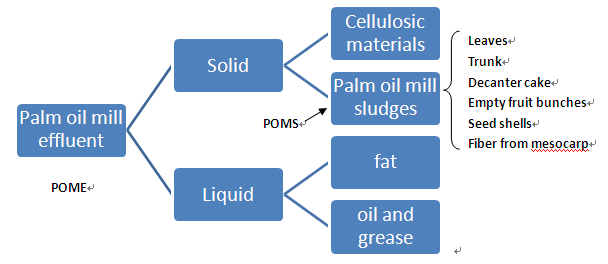The necessity to deal with palm oil mill effluent
Industry news / Chat on line / Give me a price / Date: September 27, 2014
The total oil palm cover has increased in the last few years, with a corresponding increase in palm oil production. As a result, palm oil waste which is a by-product of the milling process will also increase. The palm oil production process in mills consists of several unit operations, bunches reception, bunches sterilization, bunches threshing, fruit digestion, pulp pressing, oil clarification and oil drying.
Palm oil mill effluent is generated mainly from oil extraction, washing and cleaning processes in the mill and these contains cellulosic material, fat, oil and grease etc. Palm oil mill effluent also contains substantial quantities of solids, both suspended solids and total dissolved solids in the range of 18,000 mg L-1and 40,000 mg L-1 respectively. These solids are commonly named palm oil mill sludges (POMS). The solid waste that are produced in the process of extraction are the leaves, trunk, decanter cake, empty fruit bunches, seed shells and fiber from the mesocarp.
Among the waste generated, palm oil mill effluent (POME) is considered the most harmful waste for the environment if discharged untreated. Palm oil mill effluent is a thick brownish liquid that contains high solids, oil and grease, COD and BOD values.
Several treatment technologies have been used for POME treatment, since the direct discharge of POME adversely affects the environment. Due to the presence of high total solids in POME, attempts have been made to convert this waste into valuable products such as feed stock and organic fertilizer. Although POME is organic in nature, it is difficult to decompose in natural conditions. Earthworms can digest the POME producing valuable products such as vermicompost. Vermicompost is a useful product rich in nutrients that can be used as fertilizer in oil palm plantations. This review discusses the various ongoing treatment techniques of POME. The effective treatment of POME using vermicomposting technique is suggested as a good alternative sustainable management practice of this waste.
In one word, it’s necessary to deal with palm oil mill effluent.

The necessity to deal with palm oil mill effluent
Henan Doing Machinery , we have been concentrated on palm oil machine for 40years. If u need anything more about palm oil. Please contact us.
Palm oil mill effluent is generated mainly from oil extraction, washing and cleaning processes in the mill and these contains cellulosic material, fat, oil and grease etc. Palm oil mill effluent also contains substantial quantities of solids, both suspended solids and total dissolved solids in the range of 18,000 mg L-1and 40,000 mg L-1 respectively. These solids are commonly named palm oil mill sludges (POMS). The solid waste that are produced in the process of extraction are the leaves, trunk, decanter cake, empty fruit bunches, seed shells and fiber from the mesocarp.
Among the waste generated, palm oil mill effluent (POME) is considered the most harmful waste for the environment if discharged untreated. Palm oil mill effluent is a thick brownish liquid that contains high solids, oil and grease, COD and BOD values.
Several treatment technologies have been used for POME treatment, since the direct discharge of POME adversely affects the environment. Due to the presence of high total solids in POME, attempts have been made to convert this waste into valuable products such as feed stock and organic fertilizer. Although POME is organic in nature, it is difficult to decompose in natural conditions. Earthworms can digest the POME producing valuable products such as vermicompost. Vermicompost is a useful product rich in nutrients that can be used as fertilizer in oil palm plantations. This review discusses the various ongoing treatment techniques of POME. The effective treatment of POME using vermicomposting technique is suggested as a good alternative sustainable management practice of this waste.
In one word, it’s necessary to deal with palm oil mill effluent.

The necessity to deal with palm oil mill effluent
contact us
- QDo you want to buy machine?
- Yes, I want to buy machine.
- No, I want to learn more in advance.
- QWhat oil seeds do you want to process?
- Palm fruit
- Palm kernel/nut
- Peanut/Groundnut
- Soybean/Soya bean
- Sunflower seed
- Cottonseed
- Rapeseed/Canola
- Dried coconut
- Rice bran
- Corn germ
- More than two oilseeds:
- Other:
- QHow many tons palm fruit bunches will you process per day?
- 1-10 tons per day
- 10-30 tons per day
- 30-50 tons per day
- 50-100 tons per day
- QWhat machine do you want?
- Palm oil presser
- Other single machine (thresher, clarification tank, vibrating screen, filter...)
- Palm oil pressing line (from FFB to crude oil)
- Palm oil refining line (to produce refined, bleached, deodorized oil)
- Palm oil bottling / filling line
- QWhat machine do you want?
- Palm oil pressing line (from FFB to crude oil)
- Palm oil refining line (to produce refined, bleached, deodorized oil)
- Palm oil bottling / filling line
- QHow many tons oil seeds will you process per day?
- 1-20 tons per day
- 20-50 tons per day
- 50-100 tons per day
- QWhat machine do you want?
- Oil presser
- Other single machine (cracker, crusher, roaster, filter...)
- Oil pressing line (from seeds to crude oil)
- Oil refining line (to produce refined, bleached, deodorized oil)
- Oil bottling / filling line
- QWhat machine do you want?
- Oil presser
- Oil pressing line (from seeds to crude oil)
- Oil solvent extraction line
- Oil refining line (to produce refined, bleached, deodorized oil)
- Oil bottling / filling line
- QWhat machine do you want?
- Oil pressing line (from seeds to crude oil)
- Oil solvent extraction line
- Oil refining line (to produce refined, bleached, deodorized oil)
- Oil bottling / filling line



